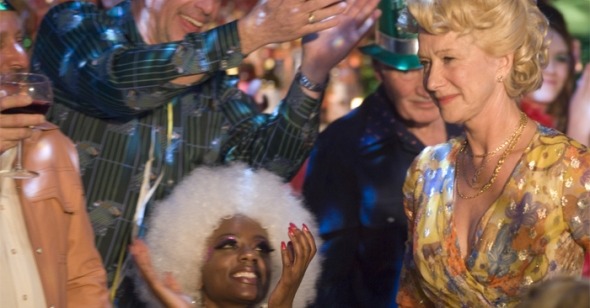Bordello of Blah
By Justin Stewart
Love Ranch
Dir. Taylor Hackford, U.S., E1 Entertainment
Taylor Hackford built his reputation early with hits like An Officer and a Gentleman and Everybody's All-American, before giving us two of the smartest and most atmospherically memorable thrillers of the Nineties, Dolores Claiborne and The Devil's Advocate. President of the Directors Guild of America and Mr. Helen Mirren, Hackford seems like a guy with an earned, solid reputation and plenty of friends. Not someone to get feverish about, but a trustworthy craftsman with eclectic taste—a mainstream toiler that auteurists can fly the flag for.
His choice to tackle this fictionalized story of Nevada’s notorious Mustang Ranch, the state's first legalized brothel, marked a chance for him to reconnect with Devil's Advocate sleaze, but Love Ranch’s tameness and sentimentality hints that the 65-year-old, whose most recent movie was 2004's Ray, is softening. The film’s reasons for existence seem clear—to give Hackford another chance to work with Ms. Mirren, whose role as the brothel’s brassy madam contrasts her queenly reputation, and to capitalize on the actress's well-admired mid-sixties hotness. Love Ranch follows through, offering up a consummated romance between Mirren's Grace Bontempo and a much younger Argentinean boxer (Sergio Peris-Mencheta), with split-second nudity for those who didn't get enough in the actress's recent New York magazine shoot.
This sensationalism is only the selling point. The whorehouse setting and profanity merely garnish a mushy love triangle melodrama involving Grace, husband and business partner Charlie (Joe Pesci), and Peris-Mencheta’s Armando Bruza. Grace does most of the legwork running Love Ranch, while she endures Charlie’s brazen philandering with the employees. A lowlife but successful schemer, Charlie is able to ensure the legality of his operation by buying votes from locals in exchange for low-rent apartments and trailers. Charlie endeavors to bring boxing back to Reno by flying in beyond-his-prime but still fit Armando, and he assigns Grace as his manager. To her it’s just another dubious scheme, but soon she’s flirting with the fighter. She sees sleeping with him as physically tempting, and a way to get some small revenge on Charlie’s ego.
Pesci, last seen in 2006’s The Good Shepard, and before that 1998’s Lethal Weapon 4, is obviously typecast here; his Charlie Bontempo is a more wrinkled version of Casino’s Nicky Santoro. The hair and suits have remained, somewhat disturbingly, unchanged, as has the mouth (first line: “Happy fuckin' New Year.”) As in Casino, you “get to” see him blown by a younger blonde and smash objects over the heads of disrespectful customers. As Grace, Mirren is more soulful but just as cynical, and the two actors have a complicit camaraderie that explains the characters’ long partnership. There's some funny, barbed back-and-forth between the owners and the prostitutes, played by people like sarcastic leader Gina Gershon, retiring Melora Walters, and Scout Taylor-Compton as Charlie's latest tween plaything. Breaking Bad’s Bryan Cranston and The Wire/Treme’s Wendell Pierce show up in the same scene together as pliable politicians.
Receding from the ranch’s rambunctious goings on, the movie’s second half offers increasingly diminished returns as Armando’s fighting career and his romance with Grace seize focus. A buildup to a boxing match and the cornily executed fight itself eat up a huge chunk of time. It's never clear why the outcome seriously matters. Grace and Armando’s romantic getaway to the hills of California is the film's nadir—the couple is never compelling or convincing in the first place, so the teary, confessional speeches told by a crackling cabin fireplace drag without payoff. In Hackford’s Out of the Past remake, Against All Odds, the affair between leads Jeff Bridges and Rachel Ward achieved serious eroticism. The Love Ranch liaison is based on the real thing between Sally Conforte and boxer Oscar Bonavena, but there’s tiresomeness to the “older woman getting her groove back with a Latin hunk” story. Armando flirts lustily with Grace, waxing romantic about Argentinean singer Carlos Gardel. He's even a poet (Argentinean men have to be, he says). “It's beautiful!” Grace squeals, after he reads her his lame, sing-song rhyming declaration of love to her.
Reading about the actual Mustang Ranch online is a more fulfilling use of time than watching the movie. Joe Conforte—the Charlie character—took it over in 1967 as one of his multiple illegal brothels until his maneuvering brought legal prostitution to Storey County. With its gun towers and gated entrance, it was a model of discreet and efficient debauchery. Safety was taken seriously, with rigorous and intimate health checks of patrons and employees. The prostitutes, who included all shapes, sizes, races, and ages, lived on the ranch during their weeklong shifts, willing prisoners. It was a fully functioning mini-society, and the Conforte’s rise and fall is ripe material for sleazy-ambitious American tragedy, complete with violent final showdown between husband and boxer-lover. But Hackford’s insistence on foregrounding the sparkless Grace-Armando romance, and his repeated reliance on hack moves like time-lapse sky shots to indicate time passing, and a smug voiceover wrap-up by Mirren, neuters the material.
